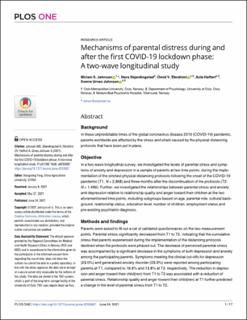| dc.contributor.author | Sinkerud Johnson, Miriam | |
| dc.contributor.author | Skjerdingstad, Nora | |
| dc.contributor.author | Ebrahimi, Omid V. | |
| dc.contributor.author | Hoffart, Asle | |
| dc.contributor.author | Johnson, Sverre Urnes | |
| dc.date.accessioned | 2022-03-01T14:59:46Z | |
| dc.date.available | 2022-03-01T14:59:46Z | |
| dc.date.created | 2021-07-01T13:39:29Z | |
| dc.date.issued | 2021-06-24 | |
| dc.identifier.citation | PLOS ONE. 2021, 16 (6), 1-17. | en_US |
| dc.identifier.issn | 1932-6203 | |
| dc.identifier.uri | https://hdl.handle.net/11250/2982197 | |
| dc.description.abstract | Background:
In these unpredictable times of the global coronavirus disease 2019 (COVID-19) pandemic, parents worldwide are affected by the stress and strain caused by the physical distancing protocols that have been put in place.
Objective:
In a two-wave longitudinal survey, we investigated the levels of parental stress and symptoms of anxiety and depression in a sample of parents at two time points; during the implementation of the strictest physical distancing protocols following the onset of the COVID-19 pandemic (T1, N = 2,868) and three months after the discontinuation of the protocols (T2, N = 1,489). Further, we investigated the relationships between parental stress and anxiety and depression relative to relationship quality and anger toward their children at the two aforementioned time points, including subgroups based on age, parental role, cultural background, relationship status, education level, number of children, employment status and pre-existing psychiatric diagnosis.
Methods and findings:
Parents were asked to fill out a set of validated questionnaires on the two measurement points. Parental stress significantly decreased from T1 to T2, indicating that the cumulative stress that parents experienced during the implementation of the distancing protocols declined when the protocols were phased out. The decrease of perceived parental stress was accompanied by a significant decrease in the symptoms of both depression and anxiety among the participating parents. Symptoms meeting the clinical cut-offs for depression (23.0%) and generalized anxiety disorder (23.3%) were reported among participating parents at T1, compared to 16.8% and 13.8% at T2, respectively. The reduction in depression and anger toward their child(ren) from T1 to T2 was associated with a reduction of parental stress. Relationship quality and anger toward their child(ren) at T1 further predicted a change in the level of parental stress from T1 to T2.
Conclusions:
The study underlines the negative psychological impacts of the implementation of the distancing protocols on parents’ health and well-being. Uncovering the nature of how these constructs are associated with parents and families facing a social crisis such as the ongoing pandemic may contribute to the design of relevant interventions to reduce parental distress and strengthen parental coping and resilience. | en_US |
| dc.language.iso | eng | en_US |
| dc.publisher | Public Library of Science | en_US |
| dc.relation.ispartofseries | PLOS ONE;16 (6): e0253087 | |
| dc.rights | Navngivelse 4.0 Internasjonal | * |
| dc.rights.uri | http://creativecommons.org/licenses/by/4.0/deed.no | * |
| dc.subject | Psychological stress | en_US |
| dc.subject | Depression | en_US |
| dc.subject | Pandemics | en_US |
| dc.subject | COVID-19 | en_US |
| dc.subject | Anxiety | en_US |
| dc.subject | Mental health | en_US |
| dc.title | Mechanisms of parental distress during and after the first COVID-19 lockdown phase: A two-wave longitudinal study | en_US |
| dc.type | Peer reviewed | en_US |
| dc.type | Journal article | en_US |
| dc.description.version | publishedVersion | en_US |
| dc.rights.holder | © 2021 Johnson et al. | en_US |
| dc.source.articlenumber | e0253087 | en_US |
| cristin.ispublished | true | |
| cristin.fulltext | original | |
| cristin.qualitycode | 1 | |
| dc.identifier.doi | https://doi.org/10.1371/journal.pone.0253087 | |
| dc.identifier.cristin | 1919863 | |
| dc.source.journal | PLOS ONE | en_US |
| dc.source.volume | 16 | en_US |
| dc.source.issue | 6 | en_US |
| dc.source.pagenumber | 1-17 | en_US |

